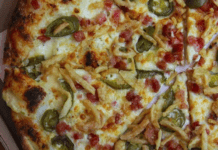Justin Lussier, CEO and co-founder of Canada’s Famoso Neapolitan Pizzeria, knows the feeling. When backpacking through Europe with his girlfriend (now wife), Lussier chanced upon his first authentic Neapolitan slice. “Thin and crispy on the outside, chewy on the inside — the taste was unlike anything I had encountered before. It was quite literally the best pizza I’d had in my life,” he enthuses.
Neapolitan pizza takes only 90 seconds to cook in a 900°F fire oven. “It takes more time to dress the pizza than it does to cook it,” jests Lussier. Who knew fast-casual dining could be so, well, speedy — and delicious?
Within hours, Lussier was on the phone brainstorming with friends back home in Edmonton about how to bring Neapolitan pizza to Canada. Fast-forward to 2007, and those same friends — Christian Bullock and Jason Allard — joined forces to launch the first Famoso Neapolitan Pizzeria in their hometown. Fortunately, Bullock had already built up a substantial résumé in the restaurant business, having co-founded the Canadian Brewhouse and Wok Box chains, before selling his stake in both companies in 2007 and 2012, respectively.
Of course, there were challenges. “I was skeptical at first to bring this new concept to Edmonton,” explains Allard, COO and co-founder, Famoso. “This [is] a blue-collar town, and we weren’t sure we would be accepted in the marketplace.” Instead, Famoso was embraced, pulling in more than $1
million in sales its first year and doubling sales in the next.
Within a year of opening their first pizzeria, the ownership team launched a second Edmonton location before invading Calgary.
A fast-growing franchise was born. Today, Famoso has 20 locations (two corporate; 18 franchises), but by the end of 2013 that number is projected to jump to 25 (one corporate; four franchises).
Though none of the three Famoso founders are Italian, their respect for tradition, and refusal to cut corners with ingredients, impresses customers. While most pizzeria franchises bring in frozen dough and settle for pre-shredded cheese, Famoso’s passionate commitment to quality has the chain’s pizza makers hand-kneading dough three times a day on average.
The team also follows the ingredient guidelines set out by the “Associazione Verace Pizza Napoletana” (“True Neapolitan Pizza Association”), an organization that certifies authentic pizzerias. This includes a highly refined “00” flour, Mozzarella di Bufala or Fior-di-Latte cheese and exclusively San Marzano tomatoes. Tomato quality is crucial for a Neapolitan pizza, since there’s technically no actual sauce. It’s simply fresh San Marzano tomatoes simmered under a quick, intense heat.
Then there’s the foundation of the business (and the pizza itself) — the very particular dough. Neither rolling pin nor machine may touch it, and pizzas can’t be more than thirty-five centimetres in diameter or be more than one centimetre thick at the centre. “We have small ladies who can eat an entire pizza themselves,”explains Allard. “This dough is very easily digestible, because it’s low in gluten. After one of our pizzas, you don’t feel like you’ve eaten this heavy meal.”
Famoso’s newest addition, executive chef Don Letendre, travelled to Naples to learn how to spin dough with Enzo Coccia, a fourth-generation pizzaiolo (pizza maker). “I don’t think I’ve ever been yelled at like that since being a kitchen apprentice,” laughs Letendre. “I’m an experienced chef, but, for some reason, I just couldn’t get how to stretch the dough properly. He did it so quickly.” Letendre finally got the knack for it while training in New York with master pizzaiolo Robert Caporuscio.
And, Letendre isn’t the only staff member who the Famoso team has flown to Naples. In fact, each time a franchise is born, the owner visits the pizza mecca with either one or all of the co-founders. Shaun Good, the first franchisee with the company, was 26 when he opened his franchise, and he had never been to Europe. “It was crazy to see that a pizzeria like Famoso sat on almost every single corner in Naples,” explains Good. “It’s amazing how passionate the locals are about their cuisine.”
Given Famoso’s rapid growth, it seems Canadians are becoming equally passionate about the chain’s long list of pizza offerings, such as the Cavoletti made with oven-roasted brussels sprouts, prosciutto crisps, gorgonzola cheese, dates, walnuts and a drizzle of honey ($15.25) or the Funghi Tartufo topped with roasted white mushrooms, oyster mushrooms, white truffle oil and grana padano ($14.75). And, Famoso sells more than just pizza, it also offers dishes such as salad and sandwiches (see “Menu Sampler” on p. 16). But, Bullock, the brand’s chief business development officer, says he’s learned that you can’t overestimate the importance of a strong corporate infrastructure. “We could easily have jumped from 50 to 100 stores in a short amount of time,” he says. “But we only have 20 at the moment. You need to stay true to your core values, and, for us, that hinges on maintaining the integrity of the product.”
That dedication has attracted heavyweight supporters. Just this year, the co-founders of the frozen-yogurt giant Yogen Früz, brothers Michael and Simon Serruya, bought into Famoso as 50-per-cent equity stakeholders. Blown away by Famoso’s flavours and top-product standards, the Serruya brothers are guiding the brand towards bigger international territory — though Bullock can’t say exactly where just yet.
“One of the biggest lessons Michael has taught us is to stay in the moment,” says Bullock, “and to focus on making your current franchise outstanding.” It’s that kind of focus that’s revolutionizing the pizza industry, one addictive — and possibly life-changing — bite at a time.
image courtesy of Randall Cosco




















